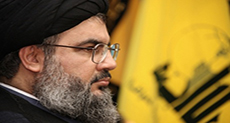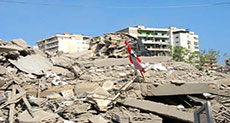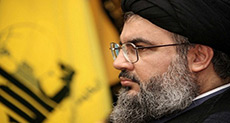Comments by various intellectuals & political analysts on July 2006 victory

Source: Hizbollah Site Staff, 14-07-2009
The twelfth of July falls on the anniversary of the "Israeli" assault against Lebanon in 2006 which ended with a victory for the resistance and a defeat of the "Israeli" occupation army, as recognized by the "Winograd" report, which demonstrated the failure of the war and "Israel's" failure to achieve any results.
On that day, the "Israeli" government raised the ceiling of its war objectives to include the elimination of Hizbullah and the-then former U.S. Secretary of State Condoleezza Rice gave the promise of a new Middle East. This promise was followed by the bombing of Lebanese infrastructure and the systematic destruction of villages in the south, Bekaa, the southern suburbs and all the areas after the enemy lost its element of surprise.
As the days of the aggression unfolded, the resistance confronted the "Israeli" war machine, a first of the surprises was bombing of the "Israeli" navy ship Sa'ar off the Beirut's coast, subsequently ousting the "Israeli" navy forces out of the battlefield. The resistance unleashed its persistent strikes against the occupation army, forcing it into a battle of psychological warfare, when the resistance strikes reached Haifa and threatened to reach beyond Haifa and further into "Israel's" depth if "Israeli" air force was to attack Beirut city.
Additionally, the "Israeli" elite forces failed to salvage "Israel" from the Lebanese tunnel, from where it had withdrawn in year 2000. Their Mirkava tanks-the pride of "Israeli" Military engineering-became coffins to the soldiers of the "Israeli" elite brigades.
"Israel", according to its usual practices, responded by stealing life from the hearts of innocent children and civilians through committing atrocious massacres in Qana, Dweir, Shayyah, Srifa, Ruwais and al-Qa'ah.
Lebanon witnessed wide scale "Israeli" destruction, the bank of targets of the "Israeli" air force reached 30,000 housing units after "Israel" failed to target the resistance or prevent the people from standing by its side during the most painfully difficult times and despite the enormous sacrifices.
On this occasion, many politicians, writers, intellectuals and Arab analysts emphasized the importance of this victory made by the steadfastness of the resistance and its people, until eventually the 14th of August emerged as the day of triumph that paved the way for the age of the major surprise.
Lebanese Minister of Labour, Mohammed Fneish today said in an interview with al-Manar television that the July war proved Lebanon's need for the resistance weapons in the shadow of an enemy lying in wait for Lebanon, persisting with its policy of making threats and aggression the latest of which the spy networks "Israel" deployed on Lebanese land.
Fneish stressed that resolution "1701" had no relevance to the topic of the continuity of the resistance role to protect and defend Lebanon, pointing out that the resistance benefited from the July war lessons in order to enhance its strengths and address the gaps that emerged to ensure Lebanon's protection from any "Israeli" new folly.
MP Mohammed Raad, the head of the Loyalty to the Resistance parliamentary bloc in Lebanon said the month of July was critical in Lebanon's resistance history of independence and sovereignty. "Israeli" superiority equation was dashed in this month, "Israel's" aggression infrastructure now dilapidated after it usually deemed easy to use to assault Lebanon with, whenever "Israeli" interests so required.
Raad added: The July triumph imposed on "Israel" to submit to the resistance equation and the strategic dimension for the benefit of the Lebanese sovereignty and national dignity. He stressed that "Israel" is still reeling stupor-struck by the resolve and steadfastness the resistance showed in battle.
For his turn, editor in chief of the 'Mahawer Strategiyya' (Strategic Centers) magazine, Ghaleb Qandil said "This is a great day in the history of the Arab people, a new international situation emerged as a result of the victory of the resistance in the July war, which debilitated the occupation army and hurled the Zionist entity in an ongoing debate over the preservation of the morale of a defeated army. Military experts recorded a severe state of moral degradation and trauma experienced in "Israel" due to this defeat.
Qandil added, "Israel" lost the deterrence reputation it had accrued since the 1967 aggression as a result of the fatal blow it was dealt, furthermore, the fact that chapters of the Winograd report remain unpublished and secret accurately reveals the size of "Israel's" defeat.
Anis Naqash the Director of the Aman (Safety) Center for Strategic Studies said the July war victory was the result of hard work and an advanced military strategy of resistance, a milestone and a turning point in the history of the Arab-"Israeli" conflict, it established a new phase in dealing with the "Israeli" war machine.
Naqash drew attention to Pentagon reports which confirmed that what Hizbullah did is considered a new military school that combines knowledge, will and faith, which led to a great loss for the "Israeli" war machine, once known as the most powerful military force in the region.
In his turn, the Secretary-General of the Palestinian National Initiative, Mustafa Barghouti considered the main lesson from the July victory is that "Israel", despite its unlimited military superiority it is unable to translate its military capabilities into political achievements, in neither cases of its aggressions against Lebanon and Gaza.
Barghouti saw that the July war proved the military force's failure to break the will of a people determined to resist and struggle, calling on the Palestinians to be steadfast, to unite and resist the "Israeli" plan to liquidate the strength elements in the Palestinian cause starting from the al-Quds (Jerusalem) issue, to the refugees' right of return.
For his part, Maher Taher, a leader in the Popular Front for the Liberation of Palestine (PFLP), stressed that this victory was strategic; its great reactions continue to reverberate in the region. The steadfastness of the resistance and the popular Arab backing as well as that of some Arab forces of resistance contributed in reining in the US' plan for a new Middle East as announced by Rice from over the rubble of residential buildings in Beirut, a plan aimed at disintegrating the region to ensure "Israeli" control over its states.
Taher added that the victory achieved by the resistance proved to the Arab generations that there is a possibility of victory over "Israel" given the will, determination and complete solidarity among the official and popular Arab resistance forces.
Military and strategic expert Brigadier General Safwat Zayyat indicated the failure of the brutal "Israeli" occupation air force strikes to break the will of the resistance, instead hope in the possibility of defeating this aggressor entity increased, despite the balance of power tilting in its favor.
Zayyat confirmed that the resistance is still able to respond to any new attack occupation leaders may consider to launch; the resistance can still provide a model for future generations to follow should they choose a path of victories. He pointed out that the image of the resistance in the Arab world is still in full swing in spite of all the counterproductive attempts to abuse it.
Omar Hamzawy, a prominent senior researcher in Carnegie Institute for Strategic Studies, clarified that the grand strategic point born from this victory is "Israel's" loss of deterrent power and its ability to launch quick lightning strikes, in addition to the changed regional atmosphere, with the people now realizing it can say "No" and resist the US-backed "Israeli" project in the region.
Hamzawy added that discussions that took place inside "Israel" proved the failure of the strategic and tactical policy of the occupation army during the aggression, and its inability to achieve any of the set out goals of the war in terms of the release of the captured soldiers, achieving a land penetration that reaches the Litani river, destroying Hizbullah's military ability or ceasing the rocket fire.
In his turn Hassan Makki, Professor at the University of Khartoum, said that the resilience revealed by the resistance forces in southern Lebanon and Gaza, gained the resistance larger and broader depth of popular recognition, especially among the youth, further clarifying that the July war proved the battle against "Israel" must not be the duty of one party alone without the others, but must be done in cooperation and solidarity between the forces of resistance.




